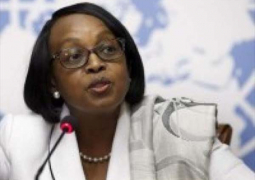Relations between the military and the civilian population was the topic of a day-long forum convened by the Association of Non-Governmental Organizations (TANGO) yesterday at TANGO hall in Kanifing.
The forum, on creating the enabling environment for civil-military responses to security threats, was organized in collaboration with the US Embassy in
It followed the successful convening of a series of civil-military seminars in 2007 and 2010 organized by the Centre for Civil-Military Relations of the US Naval Postgraduate School in collaboration with the US Embassy in
“Peace is much more difficult to wage than war – and it saves lives, increase security, and fosters advancement of a nation,” Cindy Gregg, charge d’affaires at the US Embassy in
According to her, civilian power is the new paradigm; the new standard of achievement for the US State Department.
“We wage diplomacy and development, and we do it in conjunction with our military,” she added.
She told the seminar attended by representatives of NGOs, political parties, religious bodies, among others that there are three essential elements in waging peace: communication, coordination and collaboration.
“You can’t have one without the other – private and government entities must participate fully. They must share information, support projects, and maintain decisions made as a collective. Now, combine that with today’s technology capabilities, and anything is possible,” Cindy stated.
Noting that the US is committed to an open and honest military-civilian dialogue, the US diplomat described the meeting as a step in the right direction, noting that big changes can happen with small ideas.
Ousman Yarbo, Executive Director of TANGO, in his statement, underscored the importance of the seminar, expressing hope that, at the end, the misconception about civil-military relations will be much understood.
According to Yarbo, both civilians and the military should hope to live in peace and harmony.
Presenting on behalf of the Executive Director of the National Drug Enforcement Agency, on the role of civil society in the control of crime, drugs trade and abuse in The Gambia, Kalilu Njie, the agency’s deputy executive director, stated that there is no hiding that drug abuse and drug trafficking are problematic issues in The Gambia and the West Africa region, which he said has recently been targeted for drug production and trafficking to the extent that no member state can afford to be complacent.
Declaring that The Gambia will not be in any way complacent about the issue, Njie added that his agency with the help of other sister security outfits and the Gambian civil population is doing everything possible to curb the drug menace through active collaboration and mass sensitization, education, prevention and enforcement of the Drug Control Act 2003.
“It is a common knowledge that The Gambia is largely a traditional society. There are several cultural belief systems that sometimes complicate the NDEA’s effective fight against drug. One of this is the deep- rooted culture of silence that has permeated civilian populations for a long time,” he further stated.


